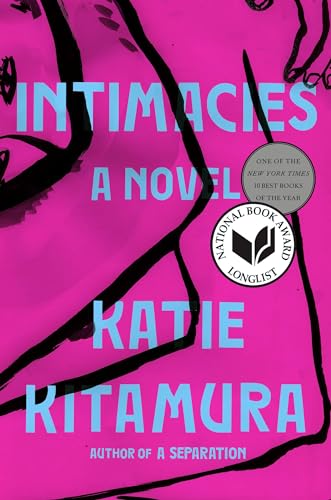Katie Kitamura’s new novel, Intimacies— out in July from Riverhead—is an elegant and gripping story about a female interpreter who is thrust into one of the International Criminal Court’s high-profile cases. The impetus for the book, Kitamura says, was the 2009 trial of Charles Taylor, the former Liberian president, who was eventually found guilty of aiding and abetting war crimes and crimes against humanity. “He was grandiose and monstrous, but so compelling,” she recalls, speaking via Zoom from her apartment in New York City. “I knew there was something there for me in fictional terms.”
The case also, unexpectedly, made Kitamura think about language, as the courtroom’s translator for Taylor was ever present. “I was fascinated by the act of interpretation,” she says. “The incredible mutability of language, the fact that it’s so pliable, and that wonderful language can be perverted.”
Kitamura’s other sources of inspiration are more literary and include Marguerite Duras, Javier Marias, and Patricia Highsmith. She cites the elliptical intensity of Duras and Marias and adds that “Highsmith is a master—her work takes the thriller narrative into territory that’s entirely psychological.”
Kitamura’s 2009 debut, The Longshot, won critical acclaim, and her third novel, A Separation, is now being adapted into a film. She says she finds she’s attracted to genre elements. Some of her novels start as mysteries or thrillers, but she’s more interested in how the characters respond to the escalating events around them than she is in conventional plot structures. “It’s not about who did it—it’s about what happens as a result,” she explains.
Kitamura began writing Intimacies, which will be her fourth novel, in 2019, several years after Taylor’s first trial. She has since realized that it takes this long for her to commit to a book. Its subject needs to have “haunted” her, she says.
As part of her research, Kitamura visited the International Criminal Court in 2016 to watch the trial of Laurent Gbagbo, the former president of the Ivory Coast, who was charged with crimes against humanity. There, she saw a number of Ivorians who continued to express support for him, despite the terrible accusations he faced.
Intimacies is not just concerned with the lives of those in the courtroom, though; it’s also a love story. The unnamed narrator has moved to the Hague from New York City to work as an interpreter for the court. She has begun making friends and has fallen for a man named Adriaan, who is recently separated from his wife. The narrator prides herself on her adaptability and worldliness—she has lived in many countries and speaks several languages—and at first seems to flourish.
But things start to fall apart. A stranger tells the narrator worrying information about Adriaan’s marriage at a party. She is assigned a role as an interpreter for the former dictator of an unnamed African country who is standing trial, and the case proves to be demanding. In a disquieting twist, the stranger from the party is revealed to be a member of the dictator’s defense team. Adriaan travels to Portugal to get a divorce and fails to keep in touch. The narrator becomes preoccupied with her friend’s brother, who was badly assaulted in a street crime. Amid the growing uncertainty, it seems as if the dictator is the only person in her life who has any regard for her, though his apparent esteem may be influenced by his need for her to express his words and thoughts.
Kitamura says she derived satisfaction from the interpreter losing her grip on her life. “I like that I put her in tricky places,” she adds. “I was interested in her being destabilized—to make her question her judgment. She is so invested in the idea of her own competence, her neutrality as a translator. I am always interested in uncertainty, and characters who don’t know. Over the last four or five years, we’ve been conditioned to polarity, to absolutes. A novel is not good at that. I’m incapable of a hot take. It takes me 10 years to figure out what I think. I’ve just learned to resign myself to the fact that I’m never going to be dynamic like that.”
As a lecturer in New York University, Kitamura is very attuned to the challenges presented by contemporary culture and our shifting certainties. “I think a lot of young writers that I love are writing in very complex ways about ambiguity,” she says. She also feels that teaching has made her a better editor and writer.
On the editing front, Kitamura also has help outside the classroom: her husband, the writer Hari Kunzru, is always her first reader. Their writing styles are different, she says, but there is nobody she trusts more.
Kitamura sees writing as part of her journey to better understand things. “I need to write,” she says. “It’s become my way of thinking about the world.”
Bonus Link:
—A Year in Reading: Katie Kitamura
This piece was produced in partnership with Publishers Weekly.











